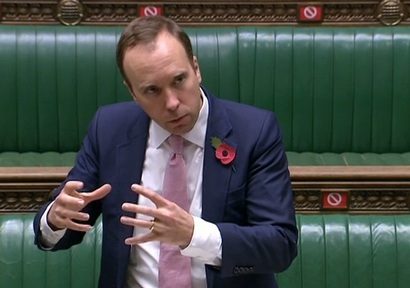Coronavirus: Elderly and care workers high up priority list for Pfizer vaccine
“Age is the biggest priority” with the elderly and care workers high up the list for a new coronavirus vaccine developed by Pfizer, England’s deputy chief medical officer has said.

Elderly people and care workers are on the “preliminary priority list” for receiving a new vaccine, which has been found to be 90 per cent effective in trials, the country’s deputy chief medical officer Professor Jonathan Van-Tam has announced.
In a Downing Street briefing last night (9 November), Professor Jonathan Van-Tam told the public: “If you look at the staggering likelihood of hospitalisation or death, with increasing age and in the elderly, I predict very strongly that there will be a very significant demand in the elderly for this vaccine.
“The vast majority of hospitalisation and death is being driven by the elderly and that hospitalisation rates rise very dramatically after the age of 50".
Professor Van-Tam said the independent body, the Joint Committee on Vaccination and Immunisation (JCVI) “will guide the government on the priorities" of who gets the vaccine and its priority list shows “age is the biggest priority”.
The JCVI priority list is as follows:
1. Older adults resident in a care home and care home workers
2. All aged 80+ and health and social care workers
3. All aged 75+
4. All aged 70+
5. All aged 65+
6. High-risk adults aged under 65-years-old
7. Moderate-risk adults aged under 65-years-old
8. All aged 60+
9. All aged 55+
10. All aged 50+
11. Rest of the population (priority yet to be determined).
Health Secretary: 'Inject hope into millions of arms this winter'
A final decision on who gets the vaccine first, will depend on whether the vaccine works well on older people.
The vaccine will be delivered in care homes, GPs and pharmacists as well as vaccination centres at venues like sports halls. GPs are to receive £150m in funding from the government to run vaccine clinics.
Speaking in the Commons on Tuesday, 10 November, Health Secretary Matt Hancock said NHS workers are ready to "inject hope into millions of arms this winter".
Matt Hancock said: "If this or any other vaccine is approved, we will be ready to begin a large-scale vaccination programme.
"We do not yet know whether or when a vaccine is approved, but I have tasked the NHS with being ready from any date from December 1."
The vaccine requires two doses to be administered. The UK has bought enough of the vaccine to treat a third of Britain's population - amounting to 40 million doses which can treat 20 million people. Ten million doses could arrive this year if it passes regulatory checks.
'Hopeful' we'll see vaccine by Christmas
Professor Van-Tam said he is "hopeful” that “we could start to see some vaccine by Christmas". However, he said, the vaccine will not arrive in time to tackle the country’s current second wave of the virus. "We've seen a swallow," he said, "but this is very much not the summer - please don't relax."
The vaccine, developed by US drug company Pfizer and German firm BioNTech, has been tested on 43,500 people in six countries - with half having received the vaccine and the other half a placebo.
Vaccine trials in the US, Germany, Brazil, Turkey, South Africa and Argentina – reveal 90 per cent protection is achieved after a second dose.
The vaccine has raised no safety concerns and the firms are applying for emergency approval to use it from the country’s regulatory body the Medicines & Healthcare products Regulatory Agency (MHRA) by the end of November.
PM: Not 'a slam dunk'
Two doses are required, followed by a wait of 14 days, Professor Van-Tam said, before an individual is protected. He said it is not yet known if the vaccine stops individuals from spreading the virus or only from developing symptoms. It is also not known how long a person’s immunity to the virus will last.
“This is really a very important scientific breakthrough, I’m certain of that”, the deputy chief medical officer said, adding that this vaccine "will prevent illness" from COVID-19 as diagnosed by a PCR test.
"We do not know yet if these vaccines will prevent asymptomatic infection. And therefore we do not know if these vaccines will prevent virus shedding, and therefore have an effect on community transmission."
The mRNA vaccine targets the S-protein in the virus, with the vaccine giving antibodies against the S-protein. It was developed by injecting part of the virus' genetic code into a person, which then produces the coronavirus spike protein. This sparks the immune system to produce antibodies and activate T-cells to fight cells infected by the virus.
In the Downing Street briefing on 9 November, Prime Minister Boris Johnson also warned that he didn't want "to let people run away with the idea that this development today is a home run, a slam dunk, a shot to the back of the net".
Latest News
 29-Jul-24
Dementia Bus gives carehome.co.uk staff insight into life with dementia
29-Jul-24
Dementia Bus gives carehome.co.uk staff insight into life with dementia
 27-Jul-23
UK's top home care agencies in 2023 revealed
27-Jul-23
UK's top home care agencies in 2023 revealed
 30-Nov-22
A quarter of older people keep their falls secret from family
30-Nov-22
A quarter of older people keep their falls secret from family
 29-Nov-22
'Covid-19 has not gone away' say terminally ill
29-Nov-22
'Covid-19 has not gone away' say terminally ill
 28-Nov-22
IT consultant who received poor care opens 'compassionate' home care business
28-Nov-22
IT consultant who received poor care opens 'compassionate' home care business